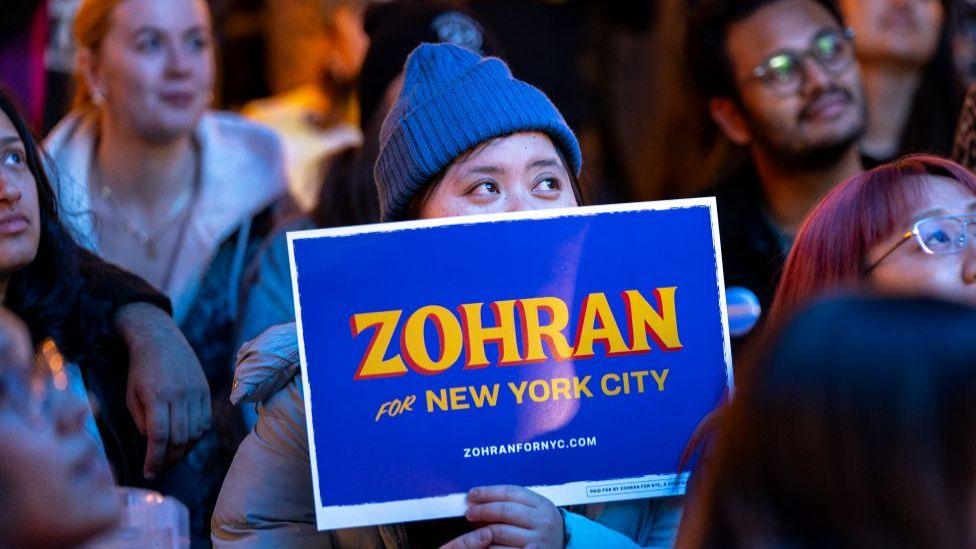What to know about Zohran Mamdani and what he wants to do as New York City mayor
Zohran Mamdani: From immigrant roots to mayor of New York City
- Published
It's official: the biggest city in the US has its first Muslim and first South Asian mayor.
Since democratic socialist Zohran Mamdani first entered New York City's mayoral race, the 34-year-old state assemblyman from Queens has risen from near-total obscurity into the national spotlight.
His bold, left-wing platform has energised progressives, shaken up his Democratic Party, and drawn harsh criticism from President Donald Trump and other Republicans.
"Today we have spoken in a clear voice: hope is alive," Mamdani told supporters after triumphing in the contest.
Unlike his more established opponents, Mamdani's new perspective, youth and new left-wing platform excited and ultimately won over voters eager for a fresher politician.
"Let City Hall, with our compassion, our conviction and our clarity, be the light that our city and our nation so desperately need," Mamdani said on the week he was elected.
Watch: US election night's big winners… in 90 seconds
- Published5 November
Rama Duwaji: Who is the wife of NYC's mayor-elect Zohran Mamdani?
- Published6 November
Birth in Uganda and Muslim faith
Born in Uganda, to parents of Indian descent, Mamdani moved to New York with his family aged seven. He attended the Bronx High School of Science and later earned a degree in Africana Studies from Bowdoin College, where he co-founded the campus chapter of Students for Justice in Palestine.
With a complex set of identities - Indian, African, American - he has faced accusations of gaming identity politics when he identified his race as both "Asian" and "Black or African American" in his 2009 application for Columbia University.
He responded to the accusations saying he was trying to capture the "fullness of my background" within the form's "constrained" boxes.
And during his campaign, the millennial progressive has leaned into his roots in a diverse city.
He has also made his Muslim faith a visible part of his campaign. He visited mosques regularly and released a campaign video in Urdu about the city's cost-of-living crisis.
"We know that to stand in public as a Muslim is also to sacrifice the safety that we can sometimes find in the shadows," he said at a rally.
Mamdani and his wife, 27-year-old Brooklyn-based Syrian artist Rama Duwaji, met on the dating app Hinge.
His mother, Mira Nair, is a celebrated film director and his father Professor Mahmood Mamdani, teaches at Columbia. Both parents are alumni of Harvard University.
Before entering politics, he worked as a housing counsellor, helping low-income homeowners in Queens fight eviction.
Like his opponents, Mamdani's mayoral campaign focused heavily on making the city safer and more affordable.
But he pushed more radical ways to accomplish those goals - some of which will be uncharted territory for New York City.
Watch: Joy precedes scrutiny, reports Nada Tawfik from inside Mamdani's victory party
Connection with younger voters
Part of what made Mamdani so successful during his campaign was that younger voters perceived him to be authentic on social media, says Jane Hall, communications professor at American University.
"You don't have to be young to be able to do it, but I think you have to be seen as being authentic and speaking to what people care about in a way that is hip and makes people want to be on the bandwagon," Prof Hall said.
Mamdani's critics have argued that he does not have enough experience to lead the largest US city effectively.
Trump has tried to paint him as radical, repeatedly calling him a communist, though Mamdani has frequently rejected that label. The president also has threatened to withhold federal funds from a Mamdani administration.
After declaring victory in the mayoral race, Mamdani addressed the president directly: "Donald Trump, since I know you're watching, I have four words for you: Turn the volume up. To get to any of us, you will have to get through all of us."
Trump promptly posted on social media: "…AND SO IT BEGINS!"
Andres Bernal, former policy adviser to New York Representative Alexandria Ocasio-Cortez, says Democrats can learn from Mamdani's ability to connect with people.
"Today's Republicans shape public discourse and they try to shape political consciousness in this country," Bernal argued. "While Democrats kind of just assume that people have fixed beliefs and they look at polls and say, okay, how do we match what we say to what we think people believe?"
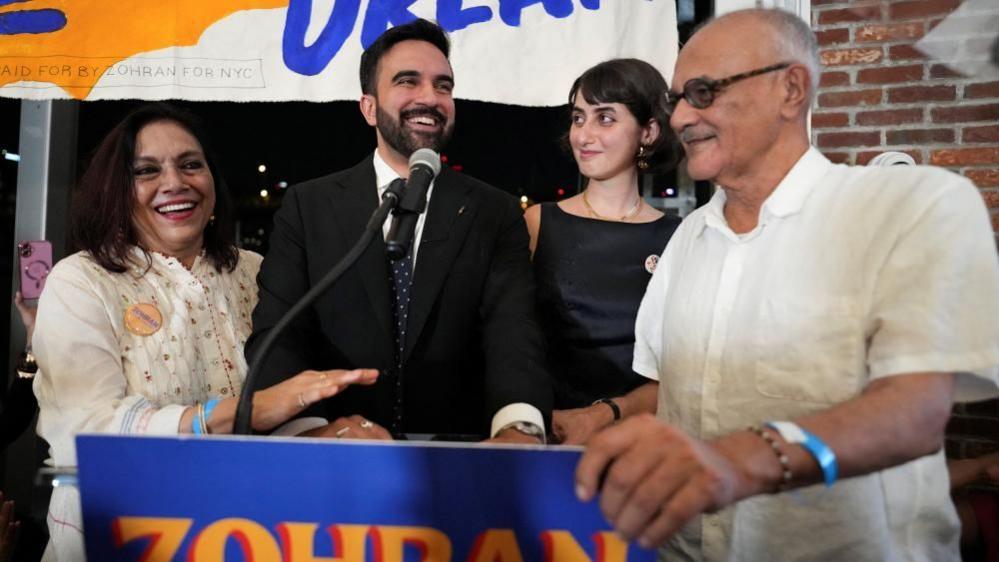
Zohran Mamdani with his parents Mahmood Mamdani (R) and Mira Nair (L) and wife Rama Duwaji (C)
Analysis: Mamdani seals remarkable win - but real challenges await
- Published5 November
Elsewhere in US elections - California approves redistricting
- Published6 November
'One of us': Ugandan pride in New York mayor with roots in their country
- Published5 November
Rent freeze plan
The high cost of housing is one of residents' most common gripes about living in the city that never sleeps.
Average rent for a one-bedroom apartment in Manhattan in November 2025 is $4,778 (£3,666), a nearly 20% increase from three years prior, according to apartment listings site RentHop. And in Brooklyn, average rent for a 1-bedroom is $3,625, about a 5% increase, according to RentHop.
One of the most talked-about points in Mamdani's housing plan is freezing rent for four years on the city's one million rent-stabilised apartments.
"This is a city where one in four of its people are living in poverty, a city where 500,000 kids go to sleep hungry every night," Mamdani told the BBC over the summer. "And ultimately, it's a city that is in danger of losing that which makes it so special."
But researchers at Maverick Real Estate Partners argue that the four-year rent freeze would be "catastrophic" for many building owners, permanently reducing their net operating income.
Pledges on groceries, childcare and buses
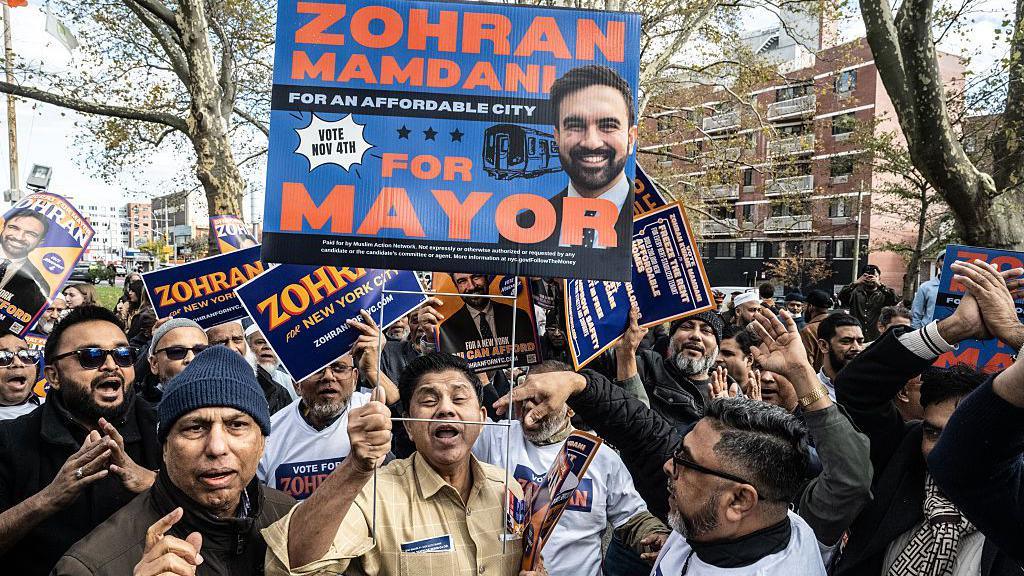
Mamdani supporters believe he's the candidate most focused on making the city more affordable
Mamdani ran on a campaign of making the most expensive US city affordable for its residents beyond simply housing.
One of his more novel ideas is creating a network of city-owned grocery stores across New York's five boroughs, expanding on the six city-owned stores. Shopping in such shops would be cheaper for customers.
But critics have argued that Mamdani's proposal ignores complex logistical realities of the food supply chain.
He also wants to make public buses free - the current fare for most riders is $2.90 - and he plans to make them faster. While Mamdani has estimated that his plan would cost the city $630m a year, the chair of the MTA told the Gothamist website that it would be closer to $1bn.
Also on Mamdani's agenda is lowering the cost of childcare, citing the experiences of friends who have told him they are leaving the city due to the high costs.
To help pay for his plans, Mamdani wants to raise the corporate tax rate to 11.5%, matching the top end of New Jersey's range. The corporate tax rate in New York City currently goes up to 7.25%.
He also wants to add a flat 2% tax for New Yorkers who make more than $1m a year. The campaign said these hikes would raise $9bn, but how they would be raised remains a question. Kathy Hochul, the governor of wider New York state, has also said she won't support the new mayor's plan to increase taxes on the wealthy.
Mamdani wants to raise the city's minimum wage - currently $16.50 per hour - up to $30 per hour by 2030.
But critics have argued that it would put many lower-skilled workers out of work and force them out of the city.
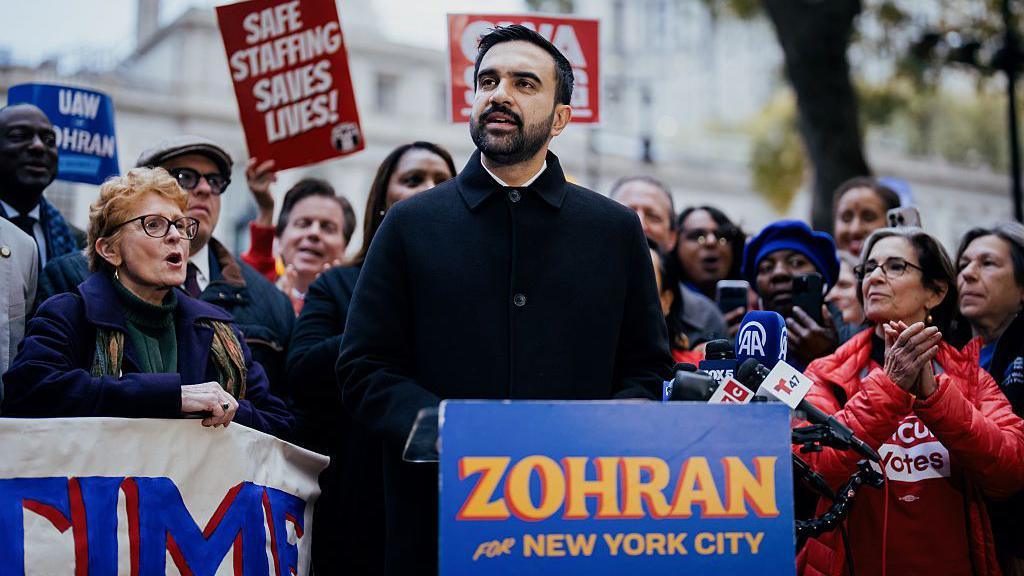
Quality of life is another major concern for New Yorkers: only 34% of them ranked the city's as excellent or good in 2025, down from 51% in 2017, according to a survey from the Citizens Budget Commission.
A flagship element of Mamdani's platform is creating a department of community safety, which would expand city mental health services, including building a system for mental health workers to respond to related 911 calls, instead of police.
Mamdani's Republican opponent Curtis Sliwa criticised the plan, saying it's unrealistic and unsafe for social workers to respond to potentially violent situations.
Views on Israel-Gaza war
Mamdani's strong support of Palestinians and staunch criticism of Israel goes further than most of the Democratic establishment.
As an assemblyman, he introduced a bill to end the tax-exempt status of New York charities with ties to Israeli settlements that violate international human rights law.
He has said he believes Israel is committing genocide in Gaza, is an apartheid state, and that the Israeli Prime Minister Benjamin Netanyahu should be arrested. Israel vehemently rejects accusations of genocide and apartheid.
Mamdani has been pressed numerous times by press in interviews to state whether he supports Israel's right to exist as a Jewish state. In a response, he said: "I'm not comfortable supporting any state that has a hierarchy of citizenship on the basis of religion or anything else, I think that in the way that we have in this country, equality should be enshrined in every country in the world." Israel says all religions have equal rights under the law.
Mamdani has also said that there is no room for antisemitism in New York City, adding that if he were elected, he would increase funding to combat hate crimes.
Additional reporting by Nada Tawfik and Rachel Hagan
Related topics
- Published5 November
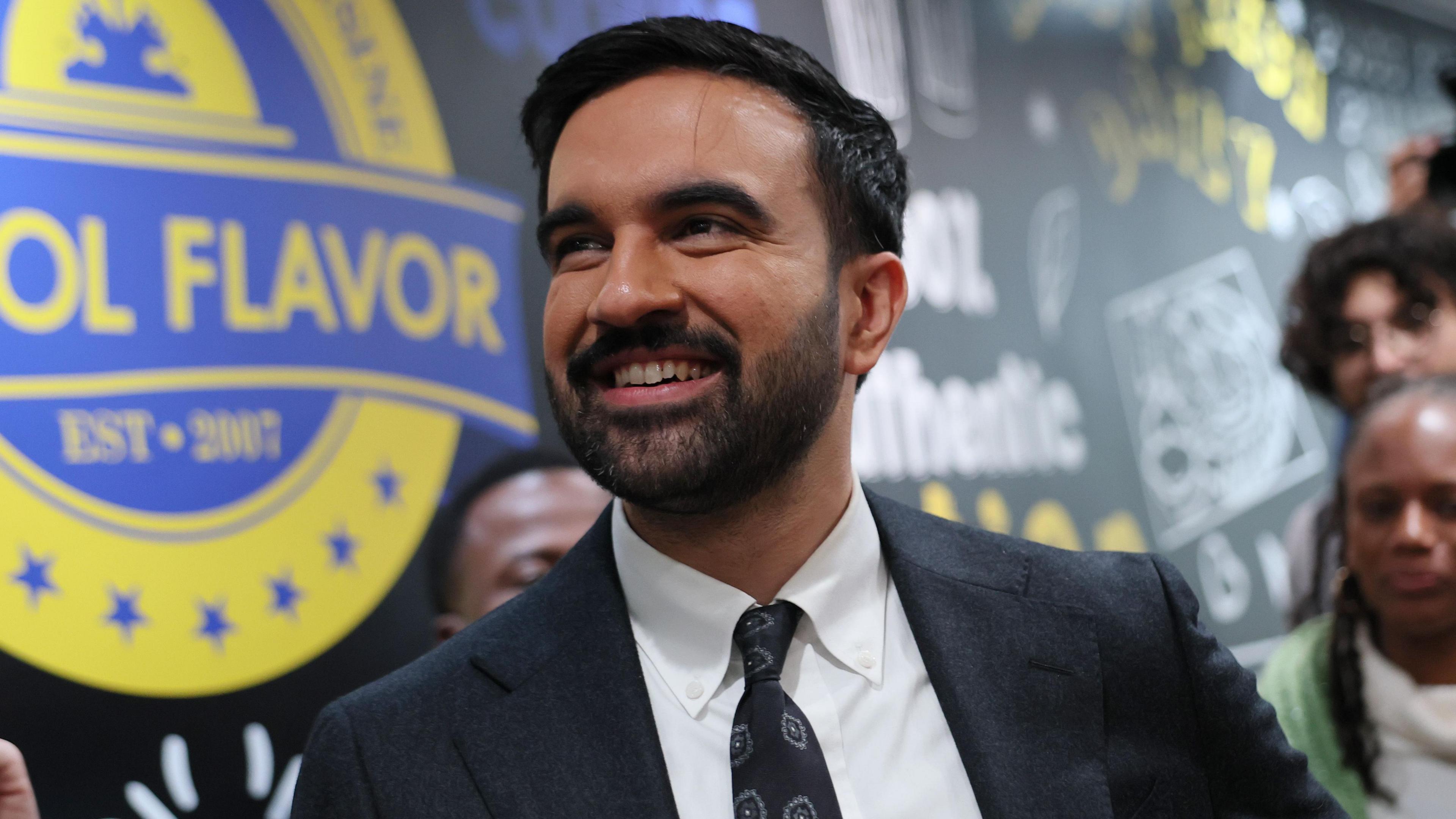
- Published5 November
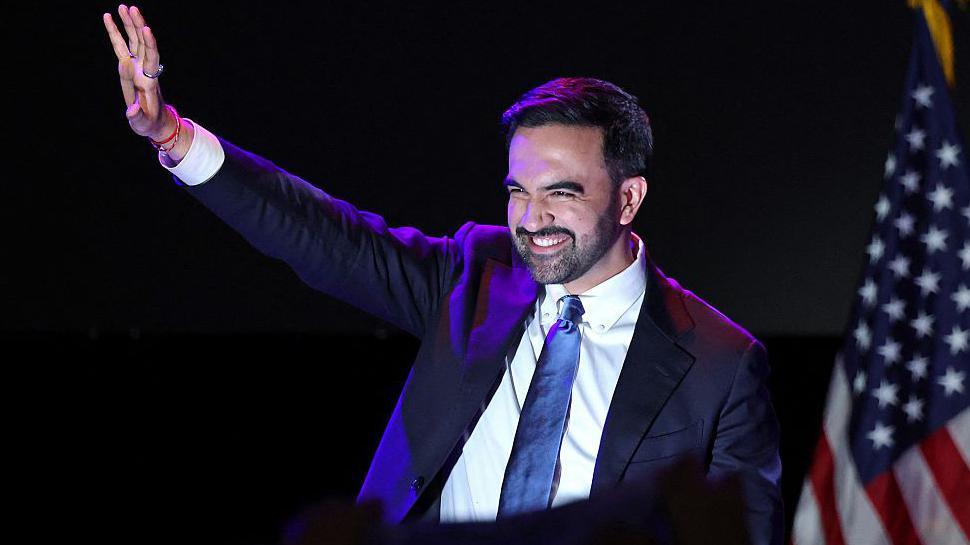
- Published5 November
